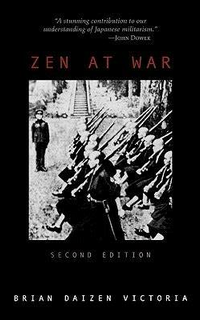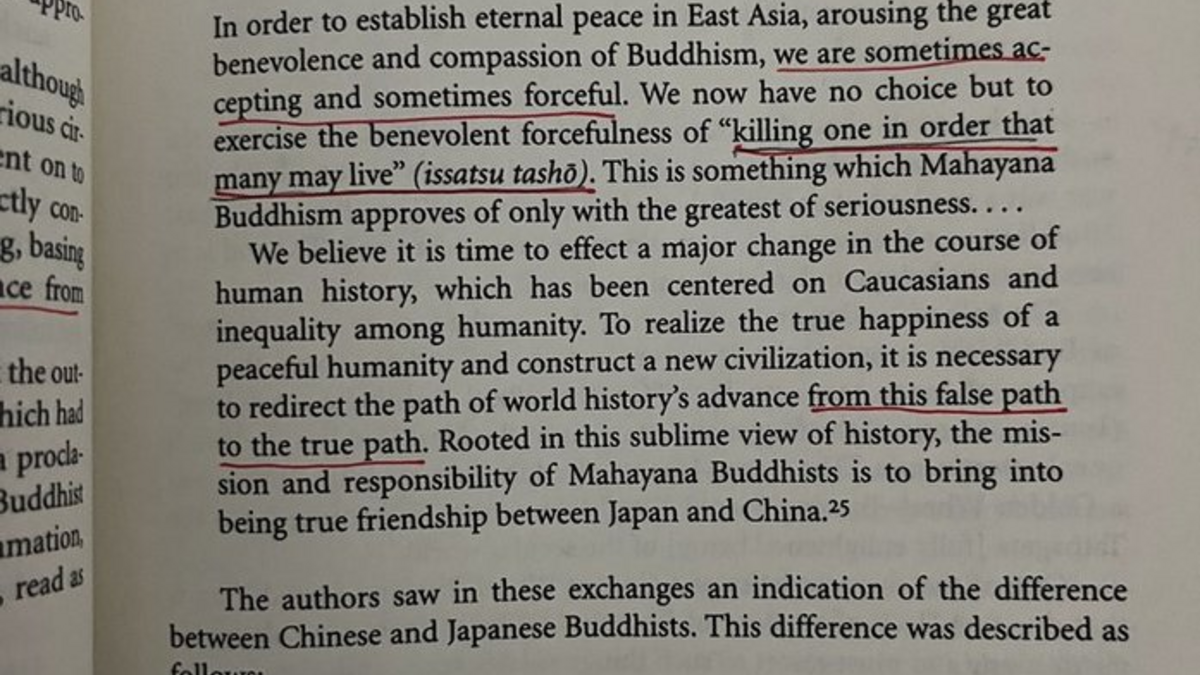Mentions
- Post
“and unless the longstanding subjugation of the Buddha Dharma to the state is recognized as a fundamental distortion if not betrayal of the Buddha Dharma, there is no guarantee that this phenomenon will not once again raise its destructive head in Japan if not in other Asian countries, including, in due course, the West.
Buddhism's support for war, including civil war, is far fror past history.”

- Post
“…institutional Japanese Buddhism remains even today in a state of" suspended fossilization. That is to say, it remains focused almost exclusively on the conduct of rites believed to benefit the dead, not the living. Generally unable and unwilling to critically evaluate Japanese Buddhism's past subservience to the state and its rulers, institutonial Buddhist leaders end up paying no more than lip service to the uni-versalistic doctrines and moral discipline that are so fundamental to their faith. In alleging this, I would happily be proven wrong.”

- Post
“In reality, Japan's defeat meant not the demise of imperial-way Zen and soldier Zen but only their metamorphosis and rebirth as corporate Zen. Perhaps Zen's newest incarnation is more benign than its past variants, in that it does not seem to require loyalty even unto death. But in the mid-1970s, a new phenomenon was detected among Japan's corporate warriors: karöshi, or "death from overwork" At least some part of postwar Japan's economic miracle must be assigned to the willingness of company employees to work themselves to death.”

- Post
“The eleventh characteristic involved Buddhism's emphasis on inner peace rather than justice. Lacking a God as the author of transcendental principles, Buddhism was not compelled to build a Kingdom of God based on justice here on earth. Furthermore, because Buddhism is a religion based on the idea of the emptiness of things, it had almost no basis for maintaining an antagonistic attitude towards State Shinto. Buddhism's focus on the inner peace of the individual also contributed to its failure to encourage and justify the will to reorganize society.”

- Post
“The lack of Buddhist dogma was the fifth characteristic Hakugen identified. Lacking a transcendent, personal God who had to be worshiped and defended, Buddhism failed to establish the type of compelling basic dogma a believer would fight to preserve. In Japan, this resulted in the neglect of both discursive thought and logical theory. Instead, Buddhism concentrated on the inner self, giving the central role to the individual's subjective feelings. There was little concern for the results of external actions.”

- Post
“According to Hakugen, this doctrine prevented the development of the Western principle of Natural Law within Buddhism, leaving the modern concepts of human rights and justice without a foundation. In the Seventeen Article Constitution, there is an admonition to "turn one's back on self-interest and embrace the public good? Hakugen believed there existed a direct connection between this and the wartime slogan "exterminate the self and serve the public" (messhi hoko). The "public" referred to, he maintained, was none other than the state and the emperor. Thus, "The teaching of 'no-self’ became both a theory and ethic serving mikado imperialism.”

- Post
“Although the authors did not make the previous statement, it was clearly implied in the last section of their book. The last paragraph of this section (and the book) expresses the essence of their message:
‘Were the level of wisdom of the world's peoples to increase, the causes of war would disappear and wars cease. However, in an age when the situation is such that it is impossible for humanity to stop wars, there is no choice but to wage compassionate wars which give life to both oneself and one's enemy. Through a compassionate war, the warring nations are able to improve themselves, and war is able to exterminate itself.’”

- Post
"...In order to establish eternal peace in East Asia, arousing the great benevolence and compassion of Buddhism, we are sometimes accepting and sometimes forceful. We now have no choice but to exercise the benevolent forcefullness of "killing one in order that many may live...
...it is neccessary to redirect the path of world history's advanced from this false path to the truth path.
In general, it can be said that Chinese Buddhists believe that war should absolutely be avoided no matter what the reason. Japanese Buddhists, on the other hand, believe that war conducted for a [good] reason is in accord with the great benevolence and compassion of Buddhism."

